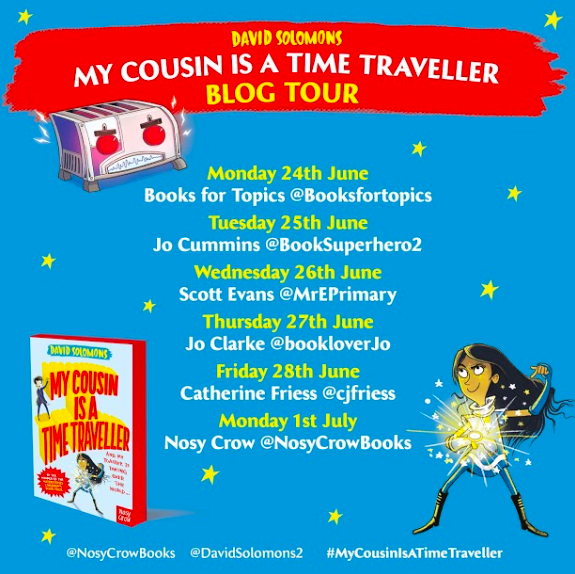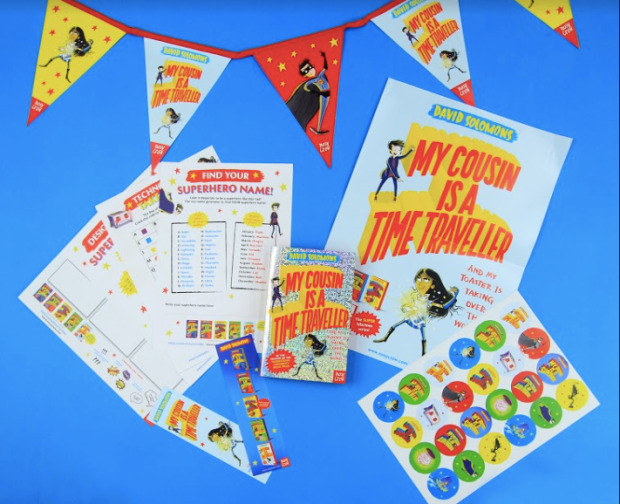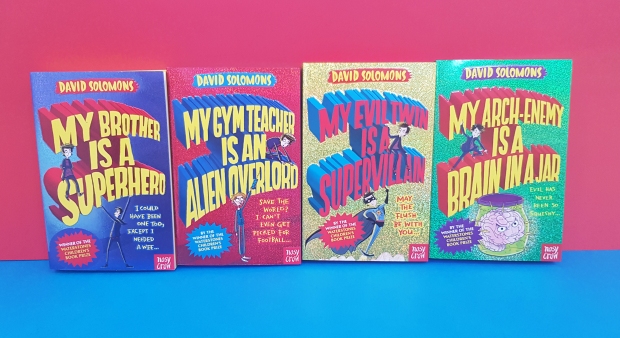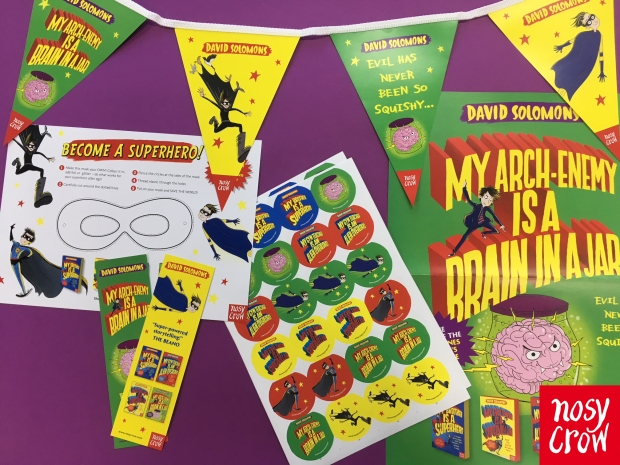Today, I’m absolutely delighted to welcome David Solomons, author of the award-winning and incredibly popular and successful My Brother is a Superhero series, to The Reader Teacher to answer my questions to celebrate the publication of the fifth and final book in the series, My Cousin is a Time Traveller, published by Nosy Crow on 27th June 2019.
My Cousin is a Time Traveller (5)
- At The Reader Teacher, for my reviews, I describe books in #3Words3Emojis.
Which 3 adjectives and 3 corresponding emojis would you choose to best describe My Cousin is a Time Traveller?
1. Superpowered
2. Toasted
3. Concluding
And if anyone can tell me where to find emojis in Word, that’d be super.
- How does it feel to bring your hugely successful My Brother is a Superhero series to an end with My Cousin is a Time Traveller?
Satisfaction tinged with sadness. I began writing these books when I became a dad for the first time, and in so many ways the series is bound up with my kids. Also, these books have changed my life, giving me an unexpected midlife change of career, so there’s inevitably some sadness in saying goodbye (to the series, not my career). However, I thoroughly enjoyed the challenge of creating a fitting ending.
- What was the most enjoyable part of writing My Cousin is a Time Traveller?
Knowing that I was heading towards a final full stop was refreshing. It helped to focus the various plot strands and gave me a sense of freedom while I was writing.
- In My Cousin is a Time Traveller, Luke discovers that his cousin can time travel (not really a spoiler alert with that title, haha!). If you could time travel, would you go forwards or backwards in time and why?
Definitely forwards in time! The past was way too dangerous. I’m terribly short-sighted and I wouldn’t have lasted two minutes before the invention of spectacles. I’d have been the straggler at the back, easy prey to every snackish sabre tooth tiger.
- If you were to choose the character that is most like you from My Cousin is a Time Traveller, who would it be and why?
A particularly apt question for this novel, since Luke and the others receive a school visit from an author who is not unlike me. In a horribly metafictional and rather sentimental tactic, I wrote myself into the narrative so that I could say goodbye personally to my lovely characters.
Reading and Writing (4)
- How has writing the My Brother is a Superhero series and the Doctor Who books been both similar and/or different for you?
A significant difference is the voice. My Brother is a first-person narrative told from the pov of an eleven-year-old boy. With Dr Who I use a limited third-person pov. There’s a bit of head-hopping, but most chapters are from a single character’s perspective, with one notable exception. I purposefully avoid seeing through the Doctor’s eyes. I wanted to keep her mysterious, alien, a bit unknowable.
- In terms of upcoming work in progresses and writing your next book for children, can you share with us any of what you have planned next?
I’m working on a new funny book for Nosy Crow, but the details are top secret for now! There’s another Dr Who on the way. It’s entitled the Maze of Doom, and there might be a Minotaur loose on the London underground, among other things.
- Hearing your book titles never fail to make me laugh. Children in all my classes have loved them. They must be some of the most brilliant in the children’s book world. How do you come up with them? What appears first in your mind: the title or the story?
First off, thank you! Frankly, they’re a nightmare to come up with. And it’s my fault, since I created a rod for my own back. I vividly remember the meeting to discuss the first sequel. I was the twit who insisted that each subsequent novel must follow the My X is a Y format. Have you noticed recently that for this age group propositional titles work very well. You could call it the ‘It Does What It Says on the Tin’ approach. Lots of The Boy Who… The Train to… The House with… Charlie Changes into… My Brother is… With so many books on offer, the title has to work hard and fast. Tell them what it’s about, at a glance.
- Currently, we seem to be living in a golden age of books, especially that of children’s literature. Can you recommend any other children’s books to children (and adults!) who may be interested in similar themes explored in your books or any that have read and would recommend?
I’m going to defer to you on this one – you read many more books for this age than I do. And I tend to avoid anything that’s like my own stuff. However, I do wonder if we’re living in a golden bubble. No question that there are lots of fabulous books published every month, and passionate people like you tweet about them, so that when I dip into this world it feels as if those books are everywhere. But sadly that doesn’t reflect the wider world. One of the things I have a gentle pop at in My Cousin is a Time Traveller is the whole celebrity-authored children’s book industry. My five cents: if a child is going to read one book a year, it would be better for that book to be one of the best published that year, and not one bought solely on the celebrity of its author. Not that I know how to make that happen! All brilliant suggestions, on the back of a ten-pound note, to my home address, please.
My Cousin is a Time Traveller and Teaching (3)
- If you were to ‘pitch’ My Cousin is a Time Traveller in a sentence for teachers to use it in their classrooms or for parents to choose to read it at home, how would you sum it up?
What if the smart appliances in your home got so smart that they decided to take over the world?
Or
What if the Terminator was a four-slice toaster?
- Could you suggest ways in which My Cousin is a Time Traveller or any of the other books in the My Brother is a Superhero series could be used in the classroom for the many teachers and primary school staff that will read this and wish to use them in their schools?
Is it OK to say I feel a sense of weariness when I read this question? I don’t write issue-driven books, or set my stories in curriculum-friendly historical milieux. When teachers want to engage a certain kind of boy, they might latch onto the superhero theme. But my experience tells me that funny books are a hard sell in the classroom. In the same way that they’re excluded from literary prizes (don’t get me started), they’re often overlooked as a teaching resource. By definition, they lack seriousness. However, I am deadly serious when I write. I wring out every drop of creativity and technique in my effort to make the books effortlessly funny. How about taking a passage that makes you laugh and digging into it? Change a word or word order in a sentence. Is it still funny? Funnier? What about the POV? Often I create humour out of the gap between the character’s perception of the world and the reader’s. Look at language. Some words are like comedy magic – inherently funny. I call it the Guacamole Effect. What I’m saying is: treat humour seriously!
- For those teachers reading this Q&A and would like to enquire about arranging the opportunity of a school visit from yourself, how would it be best to contact you regarding this?
Please get in touch with Nosy Crow (press@nosycrow.com) for anything Superhero related. And Penguin for Dr Who stuff.
Two more before you go (2)!
- What has an interviewer or blogger never asked you before, that you always wished you could answer?
I’m grateful that bloggers are kind, gentle and circumspect in their questioning, because I fear that the wrong (right?) question might unleash a tirade.
- Finally, can you share with our readers something about yourself that they might be surprised to learn?
I have a mole… in my back garden. I’m like some dastardly moustache-twirling villain from a 1970s cartoon in my attempts to off the furry menace. And as in those cartoons, I always fail. Meep-Meep!
One last one… (1)!
- Do you have a question you would like to ask the readers of The Reader Teacher?
What would encourage you to use my books in your classroom?
Thank you David for answering my questions!
Giveaway!
I have kindly been given TEN Nosy Crow POS packs for My Cousin is a Time Traveller featuring a copy of the new book and plenty of resources, bunting, badges and display materials to give away!
If you’d like to be in with a chance of being one of ten lucky winners of this very special giveaway and this utterly brilliant series-ender, simply retweet (RT) this tweet!

Be sure to check out the rest of the My Cousin is a Time Traveller blog tour for more exclusive guest posts & Q&As from David and content & reviews from these brilliant book bloggers!








